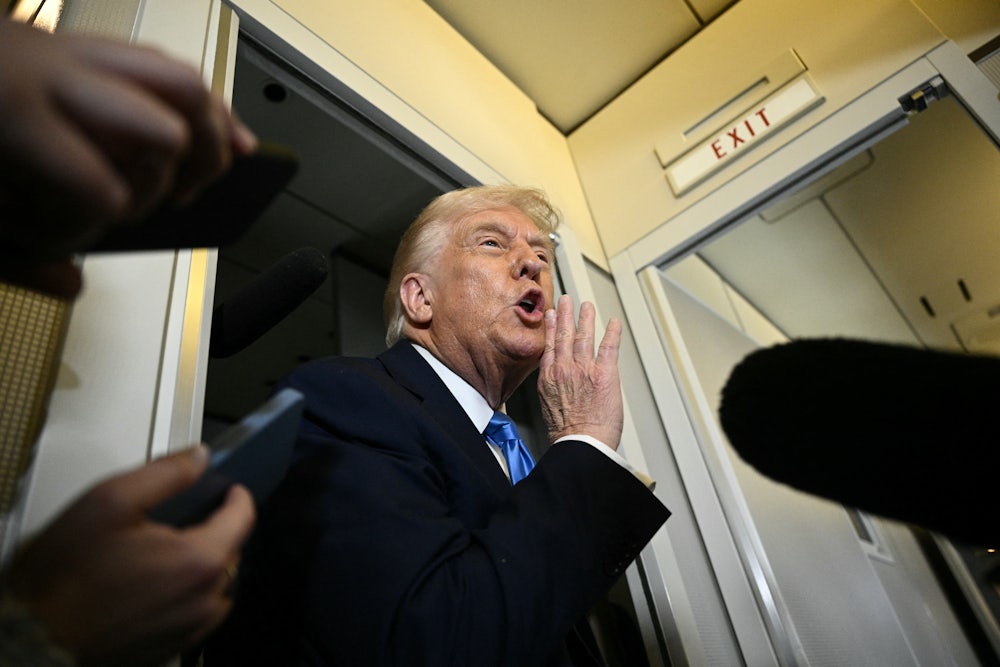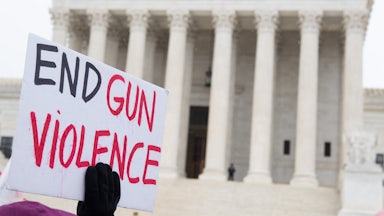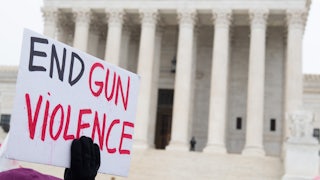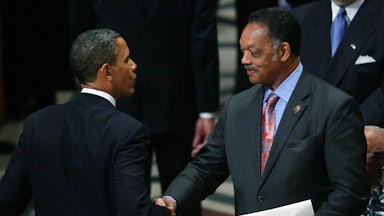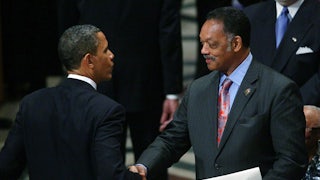President Donald Trump is less than four months into his second term, and he’s already thinking about a third one. The president has occasionally referred to the possibility that he’ll seek a third term—despite the explicit constitutional bar on it—in the past. Now he’s making his wishes known much more explicitly.
“I’m not joking,” Trump reportedly told NBC News last week. While he told the news network that he was focused on his second term at the moment, he also indicated that he welcomed calls for him to return after the 2028 election. The Twenty-Second Amendment’s two-term limit did not appear to concern him. “There are methods which you could do it,” he claimed about obtaining a third term.
One can hardly blame him for thinking it’s possible. It’s been less than a year since the Supreme Court wiped away a constitutional provision so Trump could run for reelection despite the Fourteenth Amendment’s disqualification clause for insurrectionists. The president’s approach to the judicial system is to claim as much power and immunity as possible whenever an opportunity arises. The Supreme Court has rewarded him handsomely for this strategy, and it can’t be ruled out that it might do so again.
There are at least three ways that Trump could claim a third term in office, all but one of which would be legally and constitutionally dubious. I do not count among these scenarios the possibility that he stages some sort of coup d’état in 2028 or 2029. In that event, Trump would not be holding a third term under the Constitution, but abandoning constitutional government altogether.
The first presumed path would come by some sort of electoral bait and switch. The Twenty-Second Amendment’s relevant language is as follows: “No person shall be elected to the office of the president more than twice, and no person who has held the office of president, or acted as president, for more than two years of a term to which some other person was elected president shall be elected to the office of the president more than once.”
This language is fairly categorical about running for a third term. A more hackish legal mind—the kind that says birthright citizenship isn’t real or that presidents can commit crimes without consequences—might note that the amendment’s text only deals with persons who are “elected” to the presidency, not to those who merely hold the office of the presidency.
Election, after all, is not the only way to become president. One scenario floating around Trumpworld is that Vice President JD Vance could run as president in 2028 and select Trump as his running mate, then resign on Inauguration Day to automatically elevate Trump back to the White House. Russian President Vladimir Putin pulled off a similar trick to get around Russia’s constitutional limits on consecutive presidential terms by serving as prime minister from 2008 to 2012 while his close ally Dmitri Medvedev held the presidency.
I am skeptical that the American electorate would go along with something like this in a fair and free election. Beyond those practical challenges, the greatest obstacle is that the Twelfth Amendment, which revamped the way presidents and vice presidents are elected in 1804, expressly forbids it. “No person constitutionally ineligible to the office of president shall be eligible to that of vice-president of the United States,” it says in no uncertain terms.
Another way would be through procedural chicanery. Presidential terms automatically end at the stroke of noon Eastern Time on January 20 every four years. To prevent a scenario where the presidency is completely vacant, the Twentieth Amendment designates the vice president–elect to serve as acting president until a president-elect is chosen. If there is neither a president-elect nor a vice president–elect by noon on January 20, then the Twentieth Amendment allows Congress to determine who holds the office instead, by legislation.
Under the Presidential Succession Act of 1947, the speaker of the House of Representatives would become the acting president in such a scenario. How would this work in practice for Trump? The Electoral College would need to fail to elect a president and vice president by the deadline, something that has never even happened unintentionally before in the nation’s history. The House would also need to elect Trump as speaker before that happens; House rules famously do not prevent nonmembers from being elected as speaker.
Trumpworld has floated the idea of electing Trump as speaker before. In 2021, as the recently defeated Republicans looked toward the prospect of retaking the House in 2022, leading MAGA figures like Matt Gaetz, Mark Meadows, and Steve Bannon all expressed support for the prospect of electing Trump as speaker if the GOP recaptured the House. House Republicans ultimately elected Kevin McCarthy instead, only to oust him from the post the following year. Mike Johnson, one of the least memorable figures in modern American public life, now holds it.
The problem with this strategy is that it is ridiculous. To succeed, it would need a Republican presidential ticket that is willing to run for office on the premise that it will cede power to someone who is constitutionally barred from obtaining it, or a substantial Republican majority in the House and Senate that would simply refuse to count the 2028 electoral votes if a Democratic candidate wins.
I suspect the American people would be unenthusiastic about the former and vote accordingly; the latter would be indistinguishable from a coup d’état and risk massive civil unrest. That these schemes are far-fetched is not a reason to rule them out: Trump’s plot to stay in power after losing the 2020 presidential election hinged on the nonsensical idea that the vice president could unilaterally decide the winner of a presidential election and that the Supreme Court would ultimately side with him.
Indeed, all of these schemes would also require some amount of buy-in from the Supreme Court. I can’t earnestly say that he wouldn’t receive it after the high court’s ruling in Trump v. Anderson last year. The Colorado Supreme Court had ordered Trump’s exclusion from the 2024 presidential ballot as an oath-breaking insurrectionist for his role in the January 6, 2021, attack on the Capitol. The Fourteenth Amendment’s disqualification clause unequivocally excluded such individuals from all public office.
Nine justices on the Supreme Court did not want that to happen. So they adopted a nonsensical interpretation of the disqualification clause to ensure that it wouldn’t. Even though states enforce other electoral qualifications for the presidency like age, residency, and natural-born citizenship, the justices held that Colorado (and other states) could not enforce the anti-insurrectionist requirement because they thought the Fourteenth Amendment reserved that power to Congress.
To reach this conclusion, the justices ignored the plainest reading of the constitutional text, cherry-picked from the ratification-era debates, and engineered their preferred policy outcome. The court’s unsigned majority opinion, for example, fretted that different standards in different states could lead to chaotic outcomes. “An evolving electoral map could dramatically change the behavior of voters, parties, and states across the country, in different ways and at different times,” they warned.
This self-serving justification was blatantly ignorant of basic constitutional history. At the time of the Founding, most states didn’t even allow their enfranchised citizens to vote for presidential and vice presidential electors. Ten of the 16 states during the 1798 presidential election—the first competitive one in U.S. history—chose their electors through the state legislature. South Carolinians did not vote for a presidential candidate by popular vote until after the Civil War. State legislatures retain the constitutional power to abandon the popular vote in future presidential elections, making the court’s policy desires even more atextual.
Five conservative justices went even further to hold that federal courts could also not enforce the disqualification clause absent permission from Congress, effectively writing it out of the Constitution. Justice Amy Coney Barrett and the court’s three liberal justices pushed back on that notion, to no avail. In the event that Trump won, the five conservatives wanted to ensure that no federal court would try to enforce the disqualification clause against him, either.
I bring this all up not to re-fight the disqualification battle but to emphasize the effect of the court’s decision in that case on predicting future ones. If the Supreme Court was already willing to butcher the constitutional text that badly in Trump’s favor to achieve its desired policy outcome, then it can’t be ruled out that the justices might do it again. As I noted last year, the court’s twin rulings for Trump on immunity and disqualification require us to reconsider just how far the conservative majority will go to rewrite the Constitution in his favor.
The fourth and final way that Trump could hold a third term is by amending the Constitution. Tennessee Representative Andy Ogles has already gone to the trouble of drafting an amendment that would allow Trump to run for a third term. “No person shall be elected to the office of the President more than three times, nor be elected to any additional term after being elected to two consecutive terms,” it reads in relevant part.
Ogles was so excited for the prospect of letting Trump serve as president until 2033 that he only waited three days after the inauguration before introducing the amendment. “President Trump’s decisive leadership stands in stark contrast to the chaos, suffering, and economic decline Americans have endured over the past four years,” Ogles said in an obsequious statement. “He has proven himself to be the only figure in modern history capable of reversing our nation’s decay and restoring America to greatness, and he must be given the time necessary to accomplish that goal.”
The amendment stands no chance of being ratified by a two-thirds majority in both chambers of Congress, let alone three-quarters of the state legislatures. But it is interesting in two ways. First, it would only allow a president to seek a third term if he were elected to two nonconsecutive terms, thereby only applying to the long-dead Grover Cleveland and to Trump himself. Ogles appears to have thought this through: The language would bar former President Barack Obama from running for president again and, perhaps, defeating Trump in a landslide in 2028 if the two-term limit were scrapped altogether.
Second, and perhaps more importantly, Ogles’s amendment is a concession that Trump cannot lawfully and constitutionally run for a third term right now. If Trump were capable of seeking or holding a third term in office, such an amendment would be unnecessary. Ogles’s statements also make clear that he is not rejecting the two-term tradition altogether—his interest is solely in allowing Trump to stay in power as long as possible.
The good news is that Americans have three more years before they have to really start thinking about a third term for what would be an 82-year-old Donald Trump. Other constitutional crises are far more urgent and worthy of public attention for the time being. It’s also possible that all of this is just a power play by Trump to prevent the GOP from openly starting to think about his successor, and that he doesn’t truly intend to seek or have a third term as president. The bad news is that, thanks to the Supreme Court, even the most well-enshrined constitutional principles are no longer sacrosant in the Trumpian age.
